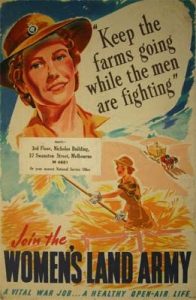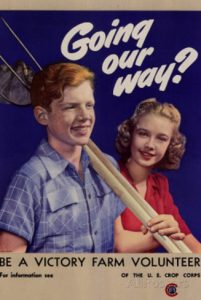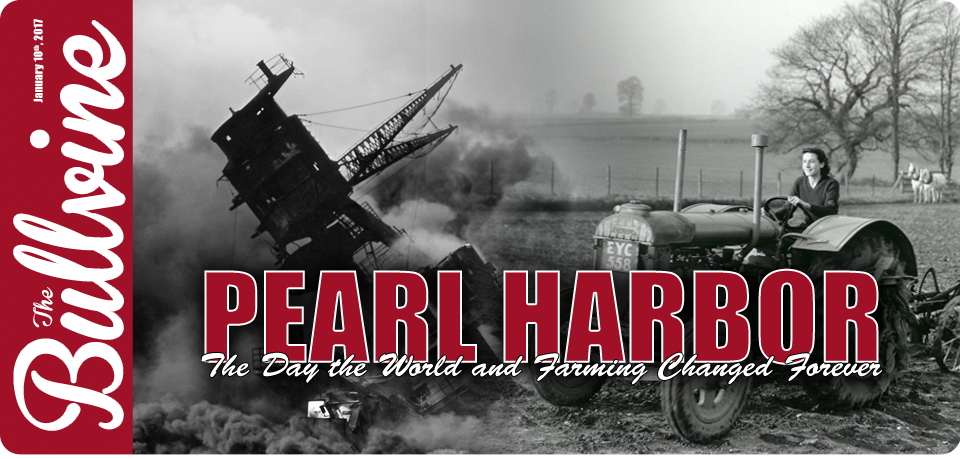Exactly 75years ago, on 7th December 1941; the world changed forever. The following day, US President Franklin D Roosevelt (FDR) declared the attack on Pearl Harbor to be “a date which will live in infamy.”
Without a doubt, Britain, Europe, and the free world as we know today, would not exist without the events inflicted by the Empire of Japan one Sunday morning on a lagoon harbor in the middle of the Pacific Ocean.

After Pearl Harbor; millions enlisted in the US military. However, US farming was propelled into an agricultural revolution. Nothing like this had happened before – or since. Before that, Britain, fighting alone in Europe against Hitler’s tyranny, had strained under the U-boat threat, and with only six weeks food supply left, was being starved into submission, and was literally fighting for her life.
Prior to Pearl Harbor, in 1940, the FDR administration introduced Land-Lease, effectively; a food export program to Britain, resulting in the US government buying up surplus US food commodities and shipping by Atlantic convoy to her British Allies. However, by 1940 FDR had already stated the US to be “The Arsenal of Democracy.”
During Prime Minister Churchill’s lengthy speech to the House of Commons on 4th June 1940 after the Dunkirk evacuation, Churchill outlined the enormity of the path ahead. The peroration is perhaps the best-known part of the address to the British nation.
“We shall fight in France, we shall fight on the seas and oceans, we shall fight with growing confidence and growing strength in the air, we shall defend our island, whatever the cost may be. We shall fight on the beaches, we shall fight on the landing grounds, we shall fight in the fields and streets, we shall fight in the hills; we shall never surrender.”
Despite this being June 1940, 18months before Pearl Harbor, the next part of the speech is often overlooked by historians, but even then, Churchill realized the freedom of Nazi Europe depended on others. He continued: “and, if which I do not for a moment believe, this island or a large part of it were subjugated and starving, then our Empire beyond the seas, armed and guarded by the British Fleet, would carry on the struggle, until, in God’s good time, the New World, with all its power and might, steps forth to the rescue and the liberation of the old.”

By 1945, 16million men and women had been drafted into the US military, from a working population of 75million. The US farmers and women, who were left behind to farm the land, fed not just the entire US population – but the Allied forces as well as Britain – and subsequently aided France. At that time, Britain was only 33% self-sufficient in food production and relied on imports from the British Empire and Commonwealth countries.
However, Britain also “Dug for Victory.” Every scrap of land was turned into a garden or allotment; town spaces were turned into makeshift gardens. Controversially, some farms were requisitioned by the British Government’s “War-Ag” department and owners forced off their farms for failing to comply with Government policy mainly, failing to plow-out land for human food production.
The rarely mentioned US Food policy produced unsung heroes and heroines of the land, and allied to an incredible 20million homespun US Victory Gardens; US citizens collectively grew 10million tons of produce, equal to all US production of fresh vegetables. Pork production increased, sales of Spam doubled to 15million cans per week, with 90% of Spam produce being destined for the armed forces.
In 1940, 21% of US labor force was employed on the land and one farmer grew enough produce to feed nine people. Within a decade, 18% were employed on the land and one farmer fed 15.5 people. By 1960, the US farm labor force was down to 8% and one farmer supplied enough food for 26 people. In 1980, 3.4% were employed on the land and one farmer fed 76 persons. Since 2000, less than 2.5% of the US population is employed on the land and one farmer feeds 100 people; a tenfold increase in 60 years.
There is no doubt that Britain would not have been able to fight on against Hitler and his deluded Nazi regime – without US military intervention. It’s also true to say the US came out of the Second World War as the winner – and a truly globally economic superpower. As a consequence of war; the US supplied the food as well as, the military hardware and equipment to execute operations.
The global scale of the Second World War damaged every major economy in the world except the US. Effectively, the war ended “The Great Depression” which had seen 11.5 million US citizens being unemployed in 1932. In 1940, 5.3million were unemployed in the US and rates dropped from 14.6% to 1.2% by 1944. The US became the center of the post-war world economy by ensuring the economic reconstruction of West Germany; France, Britain, and Japan to the US import and export needs.
Following a post-war background, Britain maintained food rationing until June 1954. Britain and Europe were effectively bankrupt; Norway had suffered severe malnutrition, and by 1945, her food consumption per person had fallen from 2,500 to 1,250 calories per day.
Severe malnutrition occurred in Occupied France as part of the surrender terms with Hitler. Massive food supplies were sent East to feed Hitler’s expanding armies, and French citizens succumbed to a 1,250 calorie per day diet. Too often, we forget lessons from history and the gratitude owed to those who ensured that freedom and democracy prevailed by the military, industrial and agri-economic means.
True political leadership was demonstrated in the 20th century; FDR policy saved the world twice; economically – through the 1930s and in the face of tyranny in the 1940s. It could be said; FDR was the greatest US President of all time. Arguably, based upon being perhaps the greatest peacetime President during the Great Depression as well as, greatest war leader or “wartime President.” Others may cite Washington or Lincoln, but FDR operated on a global war front.
All this happened as a direct consequence of the attack on Pearl Harbor on 7th December 1941. Previous to Pearl Harbor, the US had a policy of isolationism. Without Pearl Harbor; and without US involvement, Europe would have undoubtedly remained in the yoke of Nazi tyranny.
On Wednesday 11th December 1941, four days after the attack on Pearl Harbor, Hitler declared war on the United States. Japan had initiated the biggest disastrous decision of all time by attacking the US (before officially declaring war) Within days, Hitler, in the act of delusion and sheer “madness” usurped Japan, by declaring war on the US. It was the beginning of the end of Hitler. And thus… the world was changed forever.
Get original “Bullvine” content sent straight to your email inbox for free.
[related-posts-thumbnails]















Leave a Reply
You must be logged in to post a comment.